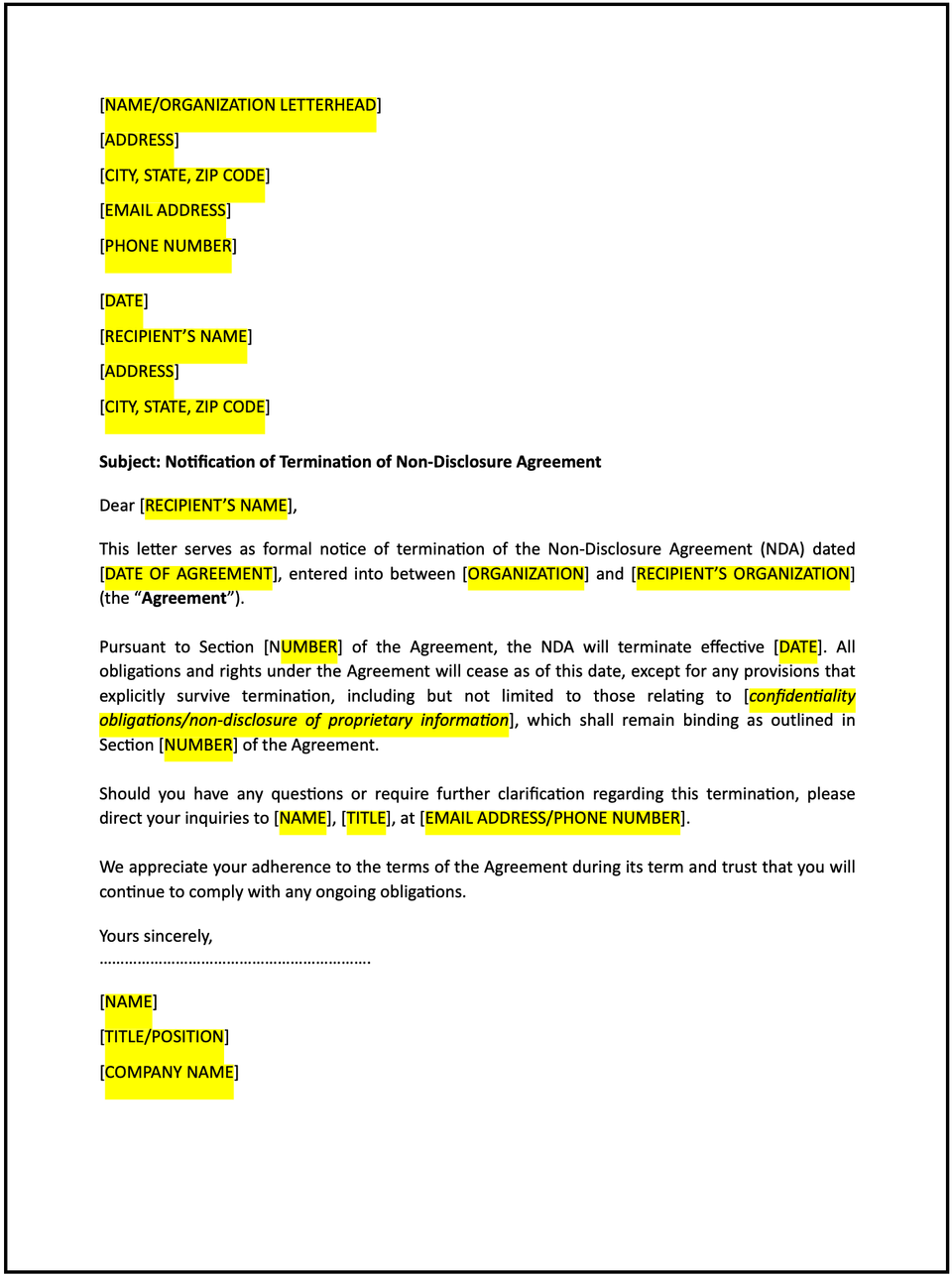Notification letter of termination of NDA: Free template

Notification letter of termination of NDA
A notification letter of termination of a non-disclosure agreement (NDA) is a formal communication used to inform a party that an NDA is being terminated in accordance with its terms. This letter outlines the termination's effective date, relevant clauses, and expectations regarding the handling of confidential information moving forward.
How to use this notification letter of termination of NDA
- Open with an introduction: Address the recipient respectfully and reference the specific NDA being terminated.
- State the purpose: Clearly communicate the intent to terminate the NDA and cite the relevant termination clause.
- Provide termination details: Specify the effective date of termination and any actions required before that date.
- Outline confidentiality obligations: Reaffirm the recipient’s continuing obligations regarding the handling of confidential information post-termination, if applicable.
- Include next steps: Mention any follow-up actions, such as the return or destruction of confidential materials.
- Reaffirm commitment: Emphasize that the termination aligns with the terms of the agreement and express a willingness to maintain a professional relationship, if appropriate.
- Maintain a professional tone: Ensure the letter is clear, respectful, and focused on adhering to contractual obligations.
- Provide contact information: Include details for the recipient to reach out with questions or discuss the termination further.
Benefits of using a notification letter of termination of NDA
This letter ensures a structured and professional way to communicate the termination of an NDA while fostering trust and compliance. Here's how it helps
- Promotes clarity: Clearly outlining termination details prevents misunderstandings.
- Reflects professionalism: A well-crafted letter demonstrates respect and adherence to the terms of the agreement.
- Reinforces accountability: Highlighting post-termination obligations ensures continued protection of confidential information.
- Builds trust: Transparent communication reinforces the integrity of the business relationship.
- Supports compliance: Addressing termination in a formal manner ensures legal and contractual obligations are met.
Tips for writing an effective notification letter of termination of NDA
- Be specific: Clearly reference the NDA being terminated, including its date and parties involved.
- Use professional language: Maintain a respectful and constructive tone to foster goodwill.
- Provide context: Briefly explain the basis for termination, referencing the agreement’s terms.
- Highlight obligations: Reiterate any continuing responsibilities, such as confidentiality provisions or material return.
- Include actionable steps: Share instructions for next steps, such as confirming receipt or returning documents.
- Keep it concise: Focus on the essential points while ensuring the tone is professional and courteous.
Frequently asked questions (FAQs)
Q: What details should I include in this letter?
A: Include references to the NDA, the termination clause, the effective date, and post-termination obligations.
Q: Should I personalize the letter?
A: Yes, addressing the recipient by name and referencing the specific NDA demonstrates attentiveness and professionalism.
Q: Who typically sends this letter?
A: Legal teams, compliance officers, or business owners typically send this letter.
Q: How formal should this letter be?
A: The tone should be professional, respectful, and focused on adherence to contractual obligations.
Q: When should this letter be sent?
A: Send the letter well before the effective termination date to allow sufficient time for any required actions.
Q: Can this letter include a request for acknowledgment?
A: Yes, requesting acknowledgment ensures the recipient is aware of the termination and understands their obligations.
Q: Is a reason for termination necessary?
A: While not always required, referencing the relevant termination clause can provide clarity and support.
This article contains general legal information and does not contain legal advice. Cobrief is not a law firm or a substitute for an attorney or law firm. The law is complex and changes often. For legal advice, please ask a lawyer.


